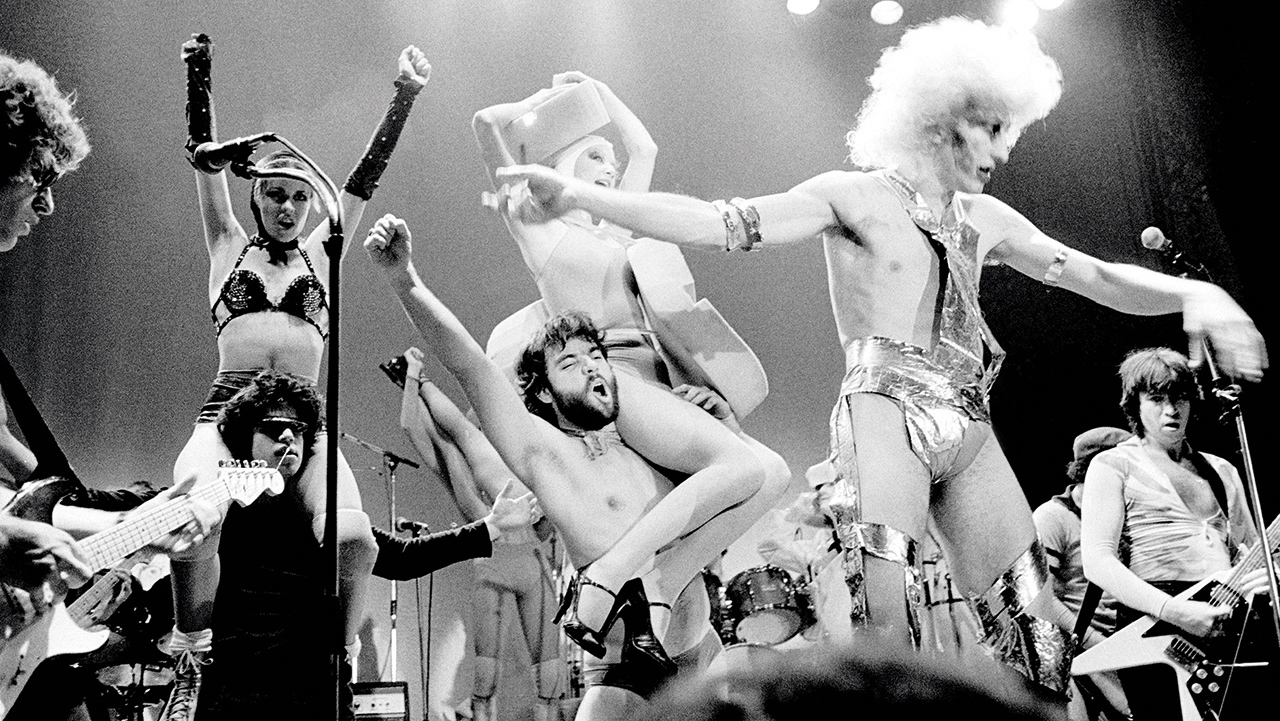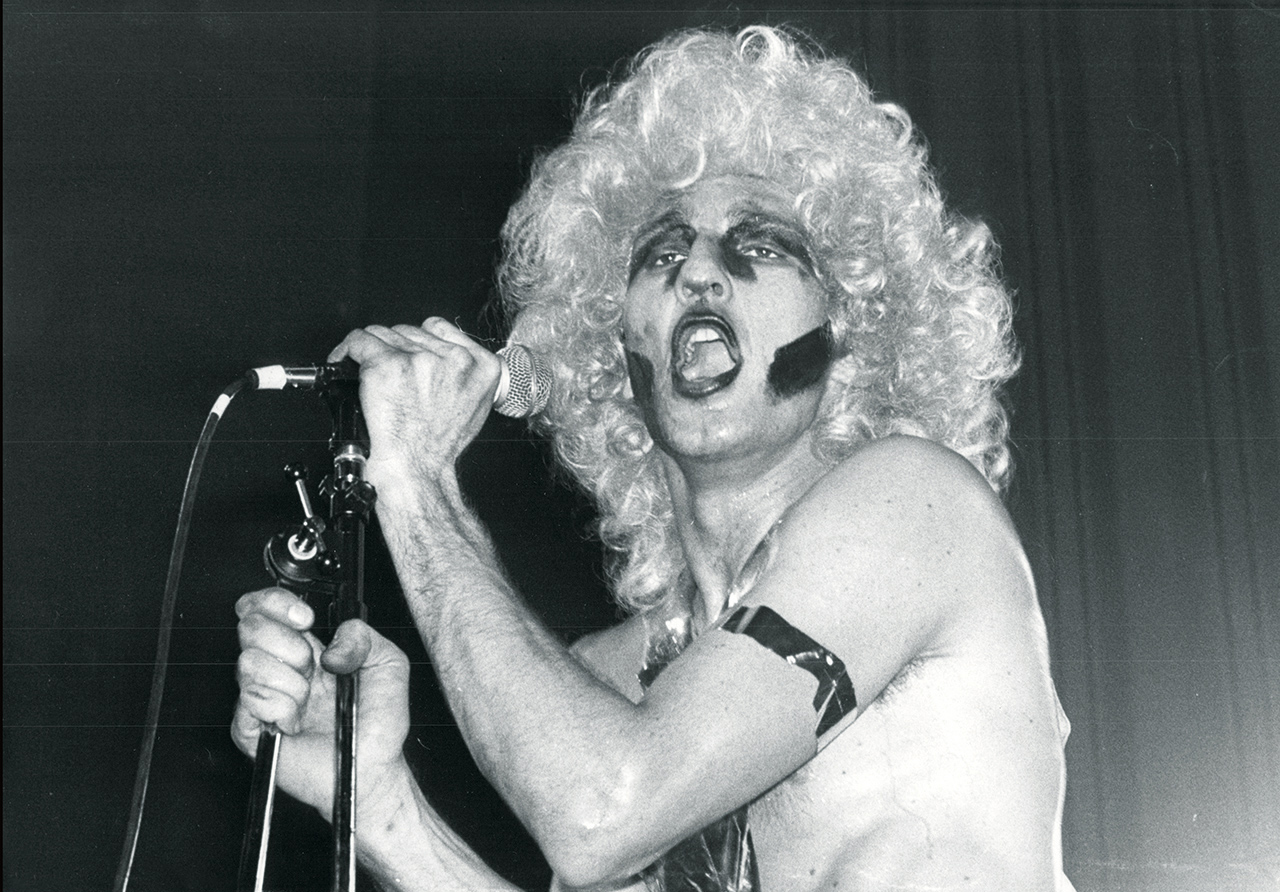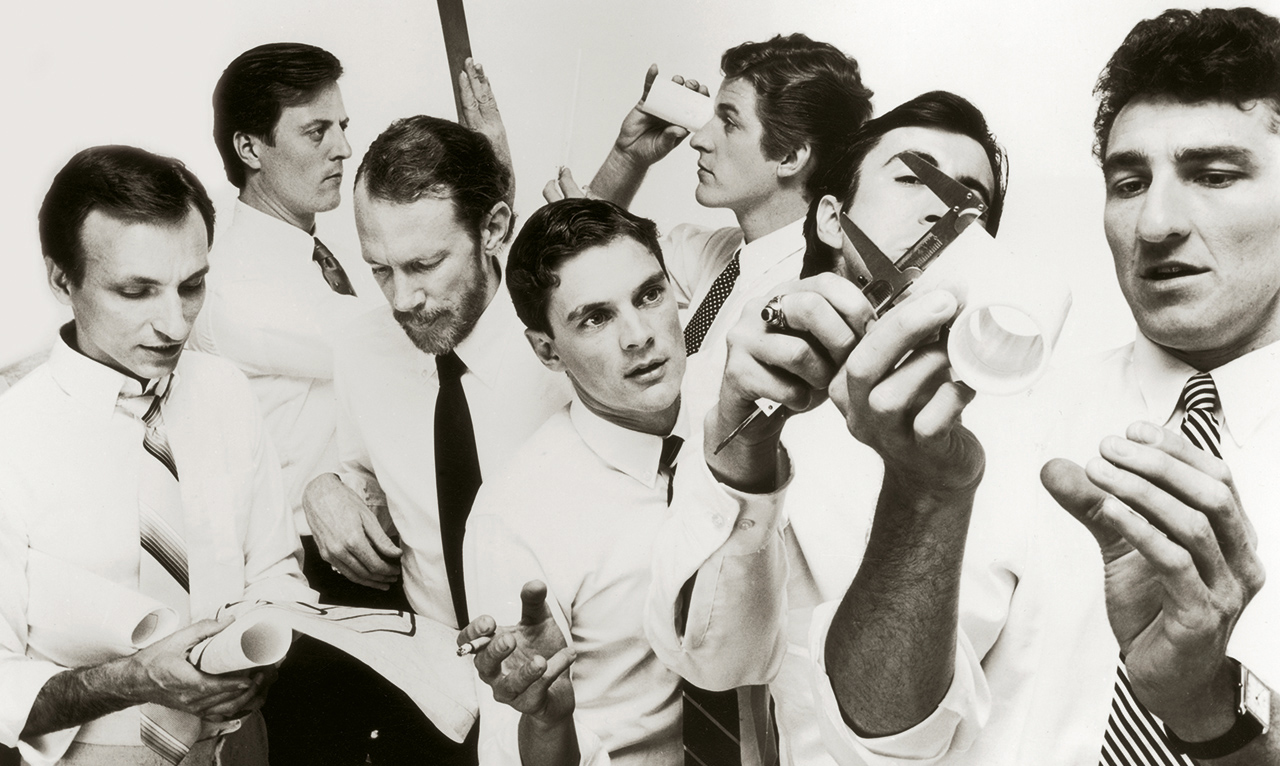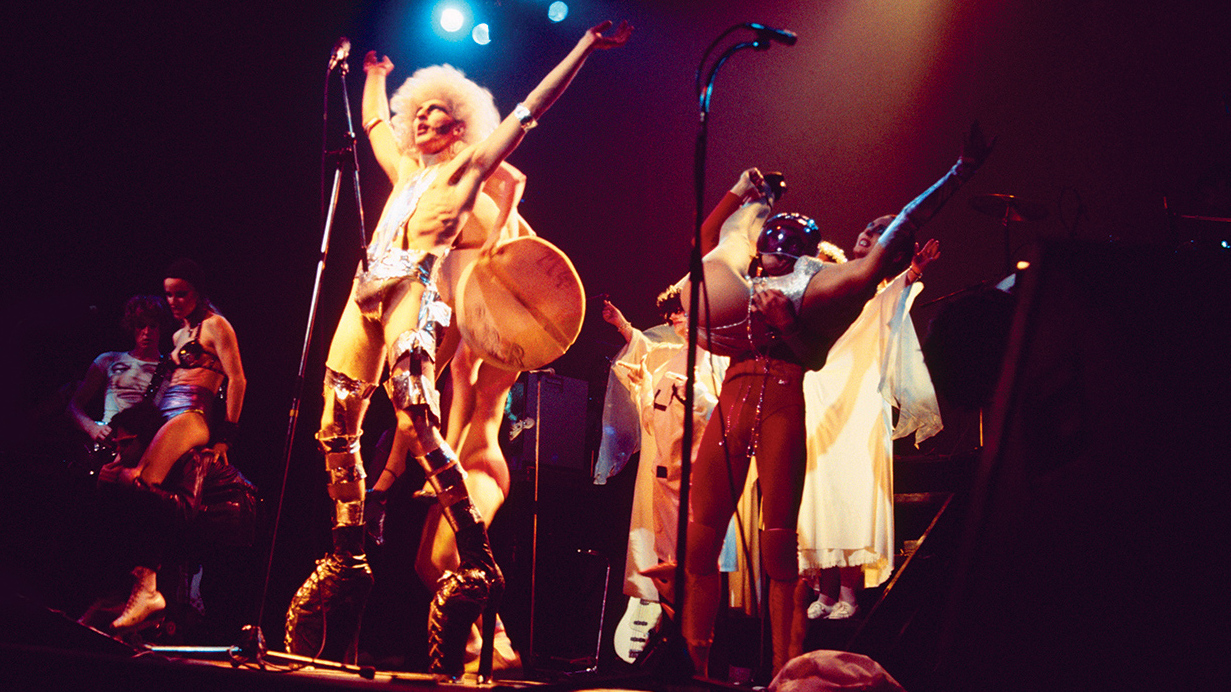If you spend any time in a government-owned facility in the Greater Los Angeles Area, you’ll probably encounter The Tubes’ frontman John ‘Fee’ Waybill working his day job. Ten years ago, when the dream of rock stardom had faded, Fee joined his ex-wife’s family business. The man who shocked audiences in the 70s as his outrageous drunk, coked-up, glam-rock alter ego Quay Lude now helps manage a million square feet of commercial property. If you’re employed by Los Angeles social services and your toilet flush breaks, he’s the man you call.
“It’s an insanely brutal job,” says Waybill. “Every email is ‘urgent’, every phone call is, ‘When’s the plumber gonna be here?’”
But Waybill is a natural. His father was an engineer who helped build Arizona’s first resort hotel and he passed on the knowledge to his son. “I got skills,” says the man who fashioned Quay Lude’s first platform shoes out of jumbo-sized tomato juice cans.
But like a rock version of Clark Kent/Superman, when John Waybill finishes his working week, he turns into that other guy. “During business hours I help fix leaky toilets. At weekends I get away from it all by singing with The Tubes.”
This October, Waybill leaves the day job behind for a month when the group play the UK and Germany. And even The Tubes can’t believe it. “It amazes me,” says guitarist Roger Steen. “But we’re something for people to get off the couch and go look at – ‘Hey, check out these idiots, they’re still jumping around.
In the 1970s, The Tubes were America’s most outrageous band. They merged sex, satire and biting social commentary with virtuoso art rock. Their live shows featured bare flesh, dancing girls, roadies dressed as giant cigarettes and a prosthetic penis. Stranger still, they then had a run of pop hits in the 80s. Then it all went wrong.
And yet here they are in 2016, still touring with four original members. Those four – Waybill, Steen, bass guitarist Rick Anderson and drummer Prairie Prince – grew up in Scottsdale and Phoenix, Arizona in the 1950s and 60s.
In 1979 The Tubes released Remote Control, a concept album about a TV addict. It could have been autobiographical. “In the summer when school was out, it was too hot to do anything except watch TV,” says Waybill. “All these sitcoms, game shows and cowboy shows like Hopalong Cassidy.”
When the visual overload became too much, Waybill and his siblings jumped off the roof of their house into a four-foot-deep paddling pool in the back yard: “Then we’d cool off and go back inside and watch more TV.”
“We were all stuck in the burning desert, frying our brains with television,” confirms Prairie Prince.
It was here, in this sizzling Death Valley climate, that The Tubes gestated. The Beatles’ appearance on TV inspired them all. By the mid-60s, Prince and Steen were playing in one high school group; Rick Anderson and future Tubes guitarist Bill Spooner and keyboard player Vince Welnick were in another.
Meanwhile, Fee Waybill was the all-singing/acting/dancing star of his local high school. “I was the theatrical Broadway play guy. I did them all – Camelot, The Sound Of Music, Oklahoma…”
In 1969, Prairie Prince took up a scholarship at the esteemed San Francisco Art Institute. The rest of his band and their truck-driving roadie, Waybill, went with him.
Spooner and Anderson’s band, now called The Beans, joined them soon after on the West Coast, but it was impossible finding gigs for two unknown groups. By the early 70s the two bands had merged, with Waybill graduating from roadie to backing singer (“I said: ‘I’ll stand here and wear some dopey outfit’”) to eventually becoming The Tubes’ frontman-meets-circus barker.

The band, completed by synth player Michael Cotton and second drummer Bob McIntosh, staged theatrical ‘mock-rock’ shows that parodied the pulp sci-fi and cowboy shows of their youth. They played anywhere that would have them: strip bars, biker bars, the art institute canteen…
“[Promoter] Bill Graham put us on as support at the Fillmore West when anyone weird came to town,” Waybill recalls. “We got compared to Alice Cooper, but we were more deviant and had more social commentary than them.”
The Tubes were about more than music. Cotton and Prince were their artistic directors and created backdrops and posters. Female dance troupe Leila And The Snakes and Prairie Prince’s girlfriend, vocalist Re Styles, joined them on stage. Kenny Ortega, who would later work with Michael Jackson, was The Tubes’ choreographer. “Kenny was and is a genius,” says Waybill. “He made all these crazy ideas coalesce.”
The Tubes made a visual statement before they’d played a note. On the night an A&R rep from A&M Records came to see them, Waybill was on stage conversing with himself on TV via a pre-recorded video. The Tubes were a multimedia experience before the term existed. “We needed to do stuff that made us stand out,” former guitarist Bill Spooner says now. “I love rock’n’roll groups, but there were so many rock’n’roll groups, but only one of us.”
The Tubes signed to A&M Records and recorded their debut with producer Al Kooper in spring 1975. They dedicated it to Bob McIntosh, who had just died of cancer, and the band still have a lot of love for that first record. “It’s really us,” says Prince. “We’d had some of those songs for years – ‘Fuck, let’s get rid of these’ – but it still works.”
The LP was bookended by two tracks that illustrate the breadth of their sound. Up From The Deep was an orchestral jazz-rock overture, White Punks On Dope a gonzo pop song lampooning spoiled teenage rock fans (‘I go crazy ’cos my folks are so fucking rich/Have to score when I get that rich white punk itch…’).
In between, The Tubes made fun of greedy consumers (What Do You Want From Life) and fetish-wear on Mondo Bondage. “That was about us boneheads from Arizona seeing gay people on Pope Street wearing assless leather chaps,” Waybill says. “No big deal now, but at the time, it was: ‘His butt is hanging out!’”
But it was White Punks that would inspire Waybill’s most popular onstage character. Quay Lude, with his blond fright-wig and platform boots, was a parody of the archetypal glam-rock star. “I was a big fan of Rod Stewart and Robert Plant, and Quay Lude’s original name was Rod Planet,” Waybill divulges.
However, the character was actually based on the New York Dolls’ frontman David Johansen. The Tubes were opening for the Dolls and were amused when the headliners arrived sporting full glam regalia in the middle of the afternoon. Waybill remembers thinking: “What a bunch of posers. I gotta take the piss out of this.”
Quay Lude appeared when The Tubes opened for Led Zeppelin at San Francisco’s Kezar Stadium in June ’73. That day, Waybill’s alter ego created havoc by tossing flour into the 60,000-strong audience, claiming it was cocaine.

I made Quay Lude’s first pair of platforms out of quart-and-a-half tomato juice cans,” he recalls. “But I took the juice out first. Halfway through the song they started to crumple down, so instead of twelve-inch heels I’m down to two.”
“We did it all ourselves,” says Prince. “We used vinyl instead of leather, and our bondage outfits were held together with Velcro and glue.”
But it worked. Everyone on the West Coast was soon talking about the band that Circus magazine called “the bull-goose loonies of the San Francisco scene”. However, A&M quickly realised that while people loved looking at The Tubes, they weren’t buying their records. Their debut LP scraped to No.113 in the US.
A second album, 1976’s Young And Rich, did a little better, and was produced by The Beatles/Bowie engineer Ken Scott, the first of several Brits involved in the band’s story. Don’t Touch Me There parodied Phil Spector’s 60s pop hits, with Waybill and Re Styles ramping up the sexual content, and Proud To Be An American mocked brainless patriotism. “But the reviews were not good,” says Roger Steen. “And that threw us in the ditch.”
A year later, the Tubes were making third album Now with another Brit, Queen producer John Anthony. But it was a volatile relationship, and the band ended up finishing the record themselves.
The release of Now in summer 1977 coincided with The Tubes dumping their manager and signing with Rikki Farr, son of British heavyweight boxing champ Tommy Farr, and the brains behind the Isle Of Wight festivals. Farr saw The Tubes in LA and, according to Waybill, “He just flipped. ‘You guys gotta go to England. They’ll love this shit!’”
Despite The Tubes barely having sold a record in Britain, Farr arranged a UK tour for November ’77. “Rikki was adept at pumping up the press,” says Spooner. “We got banned in some places because they thought we were taking the piss out of the royal family. Rikki told people the Queen was getting on stage with us. He was adept at manipulating – and I mean that in a good way.”
The Tubes arrived in the UK at the height of punk, and The Stranglers took them under their wing. “I thought punk was awesome,” says Steen. “We weren’t a punk band – we were a cabaret band – but we got into the whole image.”
The Tubes’ sold-out shows at London’s Hammersmith Odeon fulfilled Rikki Farr’s prediction: England loved this shit. After bombarding the audience’s senses for more than an hour, the performance ended with Quay Lude, some kind of fake appendage poking out of his codpiece, leading the audience in a communal chant – “You bleedin’ wankers!” – before being ‘crushed’ by a toppling speaker stack. “They came, they outraged, they conquered,” declared NME.
What Do You Want From Live, a live LP recorded in London, made the UK Top 40 in February ’78. However, The Tubes’ next tour ended early when Waybill misjudged the edge of the stage at Leicester’s De Montfort Hall.“I spiral‑fractured the fibula in my right leg,” he recalls. “I heard it snap in mid-air.”
Waybill was playing his punk alter ego Johnny Bugger and carrying a chainsaw at the time. The audience presumed his ‘brilliant pratfall’ was part of the show. Later that year, The Tubes drove an open-top Ford Fairlane on stage at the Knebworth festival, only for the front end to crash through the floor. “Yeah, it was Spinal Tap,” says Spooner.
Ask The Tubes if they ever thought the props overwhelmed the music and only one man agrees: Roger Steen. “I was the guy who thought we should be more focused on the music. We’d work on songs and then start talking about what costumes we’d need to do it in the show, instead of hammering out the parts. I love Quay Lude, he still makes me laugh, but…”
However, by 1979 The Tubes faced a much bigger problem. “In A&M’s eyes we could do no wrong,” says Prince. “But we weren’t making them any money.”
By the time Todd Rundgren produced The Tubes’ Remote Control, he had already turned one theatrical rock act into a chart-topping star. Surely Todd could do for The Tubes what he’d done for Meat Loaf with Bat Out Of Hell? Then again…
“Todd got us focused,” says Prairie Prince. “He was the one who said, ‘We got to have a concept.’”
Fee Waybill had just read writer Jerzy Kosinski’s novel Being There, about a man whose life experience is shaped by TV. At the time, the book was being made into a film starring Peter Sellers.
Remote Control offered streamlined pop rock and social commentary. The songs TV Is King and Prime Time were built for radio – except radio didn’t seem to want them. Most of the group consider Remote Control to be one of The Tubes’ best albums. “But it didn’t do that well,” Waybill admits.
A&M let them make one more record, but rejected the songs before they were even finished. “They loved us so much they had to let us go,” deadpans Prince.
Former Blood, Sweat And Tears drummer and, at the time, Capitol A&R man Bobby Colomby threw them a lifeline. But The Tubes’ Capitol deal came with one caveat. “It was a three-album deal,” Waybill explains, “but they had the option to dump us after the first album if it didn’t sell.”
Reflecting on this period in Tubes history now, Roger Steen laughs. “We were about making art,” he declares. “We weren’t about making hit singles… however much we needed them.”
The Tubes considered several producers for their first Capitol album, including Bob Ezrin and big Tubes fan Mike Rutherford of Genesis. They settled on David Foster, who had just had a hit with Earth, Wind And Fire’s After The Love Has Gone.
Fee Waybill considers Foster “one of the greatest producers ever” and thinks he saved The Tubes’ career. Bill Spooner recalls nicknaming him ‘Bambi’, “because he was such a soft-rock kinda guy”.

Roger Steen recalls overhearing Foster talking to his manager: “He was having a tense conversation about how much money he had to make each month. He didn’t understand the soul of The Tubes. It was a business to him.”
But it was a business that gave The Tubes some much-needed hits. Released in 1981, The Completion Backward Principle included the ballad Don’t Want To Wait Anymore and the brisk, power poppy Talk To Ya Later, co-written with Foster and Toto guitarist Steve Lukather. The album went Top 30 in the US.
The Tubes had pioneered the use of video in rock, but MTV audiences discovered them via Bill Spooner crooning Don’t Want To Wait Anymore in a shirt and tie. “Any song I sing is the greatest ever,” he jokes. “But yeah, that was the big 80s hair ballad thing, with lots of reverb on the snare drum.”
Both Spooner and Steen sound uncomfortable discussing ‘the Foster years’. Was it all an art prank, or were they doing what they had to do to sell records? “A lot of good things came from it,” Steen insists. “But what will stand the test of time?”
The Tubes’ next album, Outside Inside, reached the US Top 20 in ’83, thanks to another Foster-Lukather composition: She’s A Beauty was textbook 80s rock, with a textbook 80s video choreographed by the band’s old pal Kenny Ortega. But Lukather brought the song to the studio as an almost complete piece. Spooner says: “I don’t think me or Roger played a note on it. Roger was upset. I didn’t give a shit – it’s a killer track.”
After having the chart hits, the group scaled down their live show, cutting back on the dancers and retiring second drummer Mingo Lewis. The Tubes had grown into a sort of oddball pop-rock group, the kind whose songs turned up in straight-to-video movies such as 80s ‘sex‑comedy’ Hardbodies.
Fee Waybill apparently convinced his bandmates that a David Foster-produced solo album would be a boost for The Tubes. It wasn’t. Waybill’s Read My Lips was released in 1984 and bombed.
“Read My Lips – or whatever it was – sealed the deal with Capitol,” Bill Spooner explains. “They figured if the big-cheese star can’t sell records, why put money into the band – and we were an expensive band.”
The Tubes recorded Love Bomb, their final Capitol album, with Todd Rundgren producing. Waybill, who only sang on some tracks, isn’t a fan. “Fee doesn’t like Love Bomb because he wasn’t involved in it,” says Roger Steen. “And anything Fee isn’t involved in, he thinks sucks.”
He laughs when he says that, but there’s a slightly brittle edge to his voice. 1985’s Love Bomb was the last album by The Tubes’ classic line-up. Waybill left the band to pursue a career in acting (he recently played King Arthur in a US theatre production of Spamalot) and to write songs with a then up-and-coming Richard Marx.
The Tubes toured with a new singer, old Phoenix friend David Killingsworth – see YouTube for an awkward performance on The Late Show With Joan Rivers. “Terrible,” Spooner says bluntly, though Steen is more forgiving: “He was a nice guy but our songs were too high for him.”
Michael Cotton was the next to go, followed by Vince Welnick and then Bill Spooner, who was battling drug problems. “I had health issues,” he says, “most of them self-induced.”
Prairie Prince joined Todd Rundgren’s band and became a session musician. But old musical bonds proved hard to break: “I’d been playing with Roger and Rick since 1965.”
The Tubes reunited with Fee Waybill for a comeback tour in 1993. To begin with, they did it without the costumes. “But people looked at us in our jeans as if to say: ‘What the fuck…’” the singer admits. “We made our reputation and we have to live with it.”
The Tubes’ comeback album, 1996’s Genius Of America, came and went. David Medd has been The Tubes’ keyboard player ever since. Tragically, Vince Welnick committed suicide in 2006. These days, a fully functioning Bill Spooner is content to be an ex-Tube. “I hear from them occasionally,” he says. “But I’ve played with them five times in the last twenty years and that’s enough.”
Asked about the possibility of new Tubes music, Fee Waybill says he’d like to make another record but “nobody buys records any more”. It’s not like the band are short of inspiration: corporate greed, media overload and sexual fetishes are as topical now as they ever were. In the meantime, though, the 65-year-old is happy to wear “the dopey outfits” and sing the hits.
Since 9/11, it’s impossible to get a gas cylinder through customs or carry a chainsaw on a plane as hand luggage. “But we still tour with two giant suitcases of props. And people love it,” Waybill says. “I always wanted to be a rock star, and I said I’d do anything to make it happen. This is the life I wanted.”
With that, Waybill returns to the world of faulty plumbing and irate government employees: the guy you phone up when stuff goes wrong.

